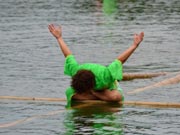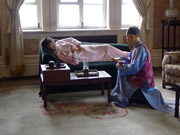Xihedao is an arts and crafts expert living in Rebgong that is an expert in identifying Thangka. He began to learn Thangka painting at the age of seven. Over decades of Thangka study, his passion for the art never faded.
"I began to learn Thangka in 1953. Actually, my ideal Thangka can't be painted out. Buddha is merciful, and the physiognomy of Buddha is hard to express--not that easy. It needs to be painted with heart, the Thangka that is painted with heart has a tranquil soul."
Thangka paintings follow strict requirements. When traditional painters draw fine lines, a layman can only see the quick drawings instead of invisible lines, but Thangka painters have the ability to understand Buddha and draw its soul onto the canvas. It's common to take a whole day to draw only one petal or a pleat.
Besides the charm of Thangka, Rebgong's cultural diversity also moves its visitors. In the 1880s, with the flourishing of Ancient Tea Horse Road, the Longwu town in Rebgong became a trade hub. Some 80 merchants from ethnic groups around Tibetan--including Han, Hui, Tu, Mongolian and Sala--set their home here. As a result, religions like Tibetan Buddhism, Han Buddhism, Islam and Taoism emerged in the region. For many years, every time the Tibetan Buddhism Longwu Temple, Han Buddhism Yuantong Temple, Taoism Erlangshen Temple and mosques needed renovation, the residents in Longwu town were willing to donate money or do the renovations themselves. Up to date, temples of different religions still keep the tradition of exchanging gifts.
We interviewed a Muslim family living on old Longwu Street. As they were celebrating the traditional Muslim festival Lesser Bairam, the table in the courtyard was piled with food to welcome guests. The host, Han Jun, treated us with warmly.
At the end of the Qing Dynasty, Han Jun's ancestors moved to what is now Longwu Street and engaged in business. They sold local tools used in animal husbandry to other areas. Their courtyard is one of the best kept old houses, and the courtyard was filled with plenty of sophisticated stones, scripts and paintings.
"All our five brothers are fond of sophisticated stones, and we have collected several hundred of them. There are many stories in the stones. We love painting as well, one particularly loves painting and the other one love calligraphy."
Walking on the streets of Longwu Town, time seems to stand still. Looking up at the wood-wall shops on the street-side, touching the fine carved window lattices and listening to the sound when walking on the gravel path, people will be brought back to an older time in the town's history. Merchants, soldiers, craftsman, Lamas, monks and Muslim merchants wearing white hats and leading their camels came here and settled down. Although they come from different places and hold different religious beliefs, they lived in harmony and respect each other.
Everyone has his or her unique road to take in life. The road you take may determine what kind of life you will lead. Let's go, to Qinghai, to Rebgong, and let's set our soul free amid the sunlight and songs.
 |

 Kerry says U.S. to make own decision on attack on Syria
Kerry says U.S. to make own decision on attack on Syria China's weekly story (2013.8.24 - 8.30)
China's weekly story (2013.8.24 - 8.30) Highlights of MAKS 2013 Int'l Aviation and Space Show
Highlights of MAKS 2013 Int'l Aviation and Space Show  Stunt performance on floating bamboo stick
Stunt performance on floating bamboo stick Home prices keep rising in August
Home prices keep rising in August 18-meter-high Rubber Duck ready to meet Beijingers
18-meter-high Rubber Duck ready to meet Beijingers Reveal the South Korean beauty production line
Reveal the South Korean beauty production line Puppet Manchurian Palace Museum in China's Jilin
Puppet Manchurian Palace Museum in China's Jilin
Day|Week|Month